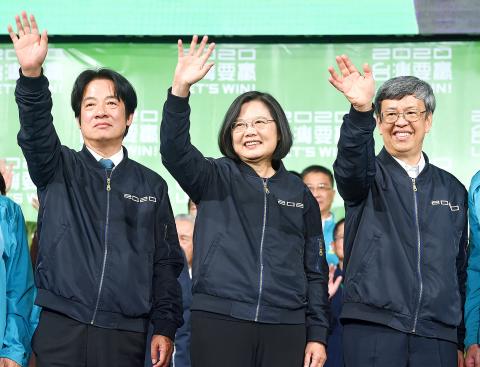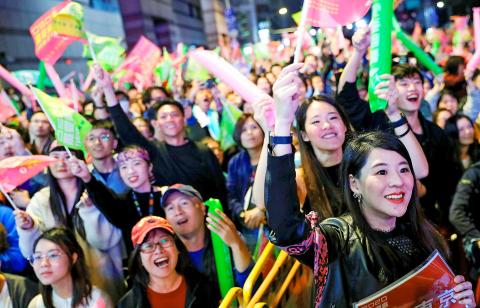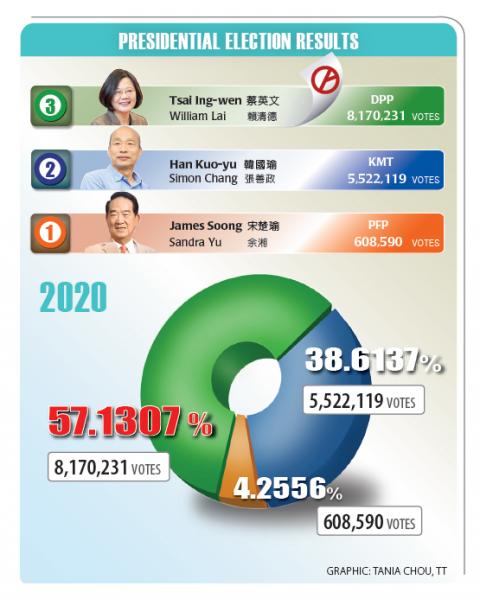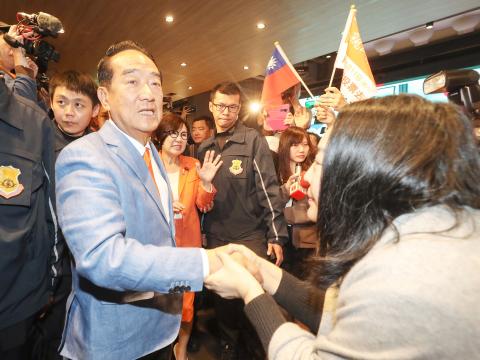President Tsai Ing-wen (蔡英文) of the Democratic Progressive Party (DPP) triumphed in the presidential election yesterday, crushing the Chinese Nationalist Party’s (KMT) hopes for a return to power by taking 57.1 percent of the vote.
Tsai secured a second term in office in a landslide victory against the rival tickets of Kaohsiung Mayor Han Kuo-yu (韓國瑜), the KMT’s presidential candidate, and his vice presidential candidate, former premier Simon Chang (張善政); and People First Party (PFP) Chairman James Soong (宋楚瑜) and his vice presidential candidate, former United Communications Group chairwoman Sandra Yu (余湘).
Voting took place between 8am and 4pm at 17,226 polling stations nationwide.

Photo: Chien Jung-fong, Taipei Times
The ticket of Tsai and her running mate, former premier William Lai (賴清德), won 8,170,231 votes, or 57.13 percent of the 19,311,105 registered voters, with the Han-Chang ticket garnering 5,522,119 votes (38.61 percent) and the Soong-Yu ticket receiving 608,590 votes (4.26 percent).
The total number of votes that Tsai received increased by 1,275,442 from 6,894,744 in 2016, when she received 56.1 percent of the total vote. It also surpassed the record of 7,659,014 votes that then-KMT presidential candidate Ma Ying-jeou (馬英九) received in the 2008 presidential election.
The votes for the KMT’s ticket yesterday increased by 1,708,754 from 3,813,365 in 2016, when it received 31.0 percent of the total vote.

Photo: Tyrone Siu, Reuters
In 2016, Soong garnered 1,576,861 votes, or 12.8 percent of the total vote.
In her victory speech, Tsai pledged “to do more and to do better” in her second term, adding: “We will not forget to engage in introspection just because of the [electoral] victory.”
Expressing gratitude to people who voted, she said that regardless of whom they voted for, “it is an implementation of democratic values.”

With every presidential election, Taiwanese tell the world that “we cherish the democratic way of life and cherish our country, the Republic of China (Taiwan),” she said.
She said she would listen to constructive criticism that Han and Soong have to offer.
Tsai said that her administration would continue to push for reforms, make progress with national construction projects, and close the income gap between rich and poor people.

Photo: CNA
She added that she would continue to keep the nation safe and protect its sovereignty.
“I also hope that Beijing understands that democratic Taiwan, and our democratically elected government, will not give in to threats and intimidation,” Tsai said.
Han conceded defeat last night, saying that Tsai had won a second term.
Han said that he had not tried hard enough and let his supporters down.
He asked people to remain calm, adding: “I have called President Tsai to congratulate her. She has a new mandate for the next four years.”
Han told supporters in Kaohsiung that he expects to see a united Taiwan, and that Tsai would lead the nation to a happier life.
Han, who took time off from his mayoral duties to campaign for the presidency, is to return to his Kaohsiung post tomorrow.
Soong also conceded defeat.
Expressing gratitude for the people who supported him, Soong said that he respected the decision of the nation, as the process is a reflection of Taiwan’s democratic values.
Soong said it was important that the government form a professional administration, and not resort to cronyism and nepotism, which would mar the civil service and negatively affect the public through reckless reforms.
Additional reporting by AFP and CNA

Tropical Storm Gaemi strengthened into a typhoon at 2pm yesterday, and could make landfall in Yilan County tomorrow, the Central Weather Administration (CWA) said yesterday. The agency was scheduled to issue a sea warning at 11:30pm yesterday, and could issue a land warning later today. Gaemi was moving north-northwest at 4kph, carrying maximum sustained winds near its center of up to 118.8kph and gusts of 154.8kph. The circumference is forecast to reach eastern Taiwan tomorrow morning, with the center making landfall in Yilan County later that night before departing from the north coast, CWA weather forecaster Kuan Shin-ping (官欣平) said yesterday. Uncertainty remains and

SEA WARNING LIKELY: The storm, named Gaemi, could become a moderate typhoon on Wednesday or Thursday, with the Taipei City Government preparing for flooding A tropical depression east of the Philippines developed into a tropical storm named Gaemi at 2pm yesterday, and was moving toward eastern Taiwan, the Central Weather Administration (CWA) said. Gaemi could begin to affect Taiwan proper on Tuesday, lasting until Friday, and could develop into a moderate typhoon on Wednesday or Thursday, it said. A sea warning for Gaemi could be issued as early as Tuesday morning, it added. Gaemi, the third tropical storm in the Pacific Ocean this typhoon season, is projected to begin moving northwest today, and be closest to Taiwan on Wednesday or Thursday, the agency said. Today, there would likely

DISRUPTIONS: The high-speed rail is to operate as normal, while several airlines either canceled flights or announced early departures or late arrivals Schools and offices in 15 cities and counties are to be closed today due to Typhoon Gaemi, local governments announced last night. The 15 are: Taipei, New Taipei City, Taoyuan, Tainan, Keelung, Hsinchu and Kaohsiung, as well as Yilan, Hualien, Hsinchu, Miaoli, Chiayi, Pingtung, Penghu and Lienchiang counties. People should brace for torrential rainfall brought by the storm, with its center forecast to make landfall on the east coast between tonight and tomorrow morning, the Central Weather Administration (CWA) said. The agency issued a sea warning for the typhoon at 11:30pm on Monday, followed by a land warning at 11:30am yesterday. As of

CASUALTY: A 70-year-old woman was killed by a falling tree in Kaohsiung as the premier warned all government agencies to remain on high alert for the next 24 hours Schools and offices nationwide are to be closed for a second day today as Typhoon Gaemi crosses over the nation, bringing torrential rain and whipping winds. Gaemi was forecast to make landfall late last night. From Tuesday night, its outer band brought substantial rainfall and strong winds to the nation. As of 6:15pm last night, the typhoon’s center was 20km southeast of Hualien County, Central Weather Administration (CWA) data showed. It was moving at 19kph and had a radius of 250km. As of 3pm yesterday, one woman had died, while 58 people were injured, the Central Emergency Operation Center said. The 70-year-old